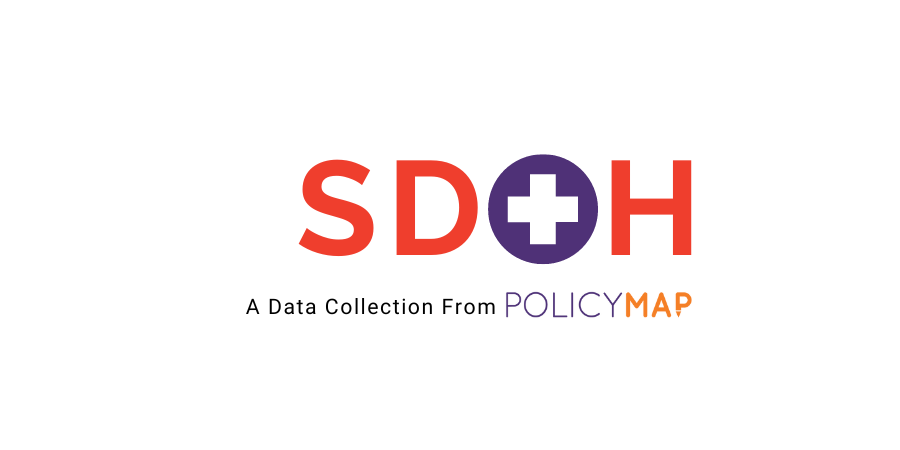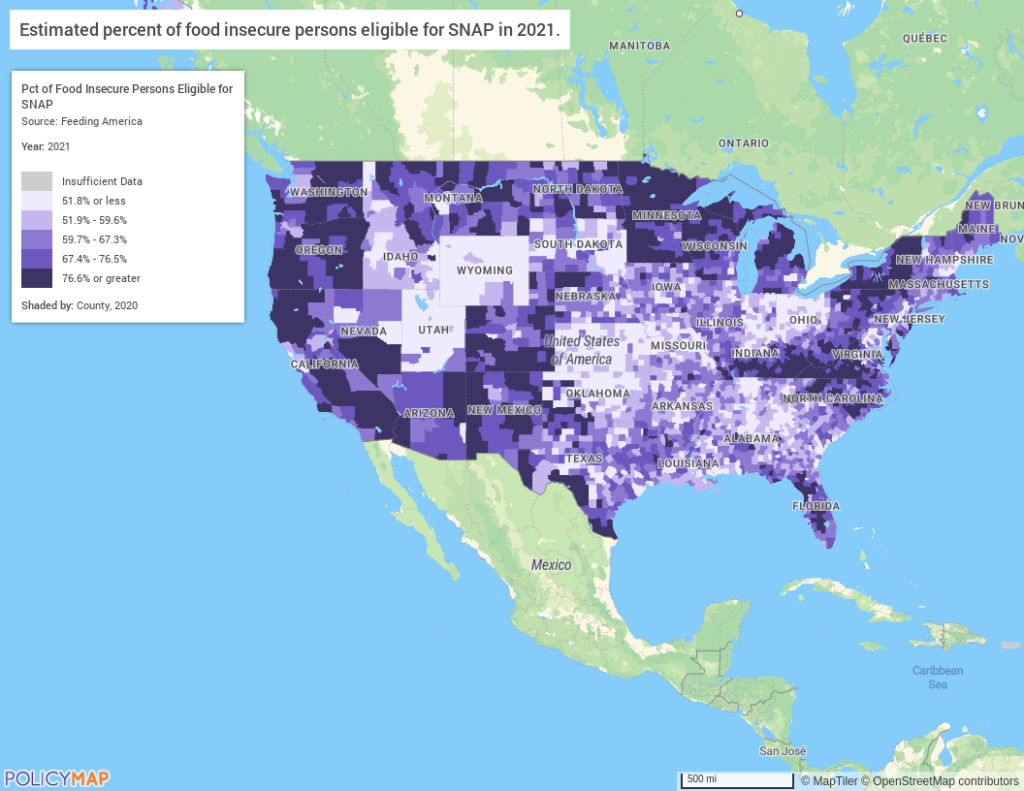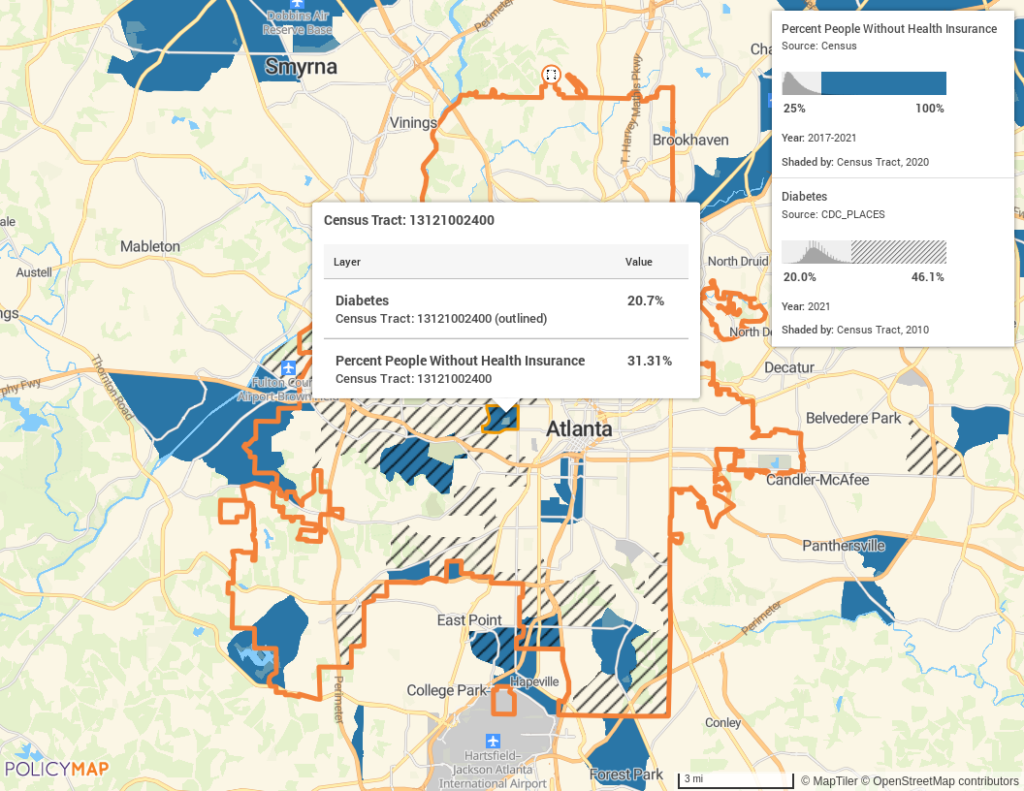Social Determinants of Health Data Collection
Understanding neighborhood conditions is essential to keeping people healthy and cutting medical costs. Digging deeper into Social Determinants of Health (SDOH) can open the door to cost-effective and community-based interventions.
Go beyond demographics with PolicyMap’s Collection of Social Determinants of Health Data. The collection includes all the non-medical factors influencing health and quality of life, supporting organizations as they work to improve outcomes, reduce inequalities, and optimize costs.


SDOH Data Use Cases
Our SDOH data is research-ready and can help you locate areas with disparities in housing, transportation, internet access, environment, access to nutritious foods, economic opportunity, mental and physical healthcare, clinical trials, and more.
To gain a more comprehensive understanding of patient populations, develop targeted interventions, and allocate resources more effectively, researchers, healthcare providers, payors, pharma companies, CROs, and other health organizations can integrate our community-driven SDOH data with clinical and claims data.
Access PolicyMap’s SDOH Data Collection
There are two ways to access the Collection of SDOH Data: add an additional menu tab to your PolicyMap application, or license the collection through our API or flat files.
PolicyMap’s Curated Collections are industry-specific data conveniently organized in one place. Click here to learn more.

What is included in the Collection of SDOH Data?
Our SDOH data is organized by determinant and by race/ethnicity. Determinants include life expectancy and mortality, health/healthcare landscape, infrastructure/built environment, community/social context, food and nutrition, education, healthy assets/opportunities, financial stability, and environmental hazards. Where possible, our data is disaggregated by race, ethnicity, age, etc.
These data elements, combined with statistical methodologies and machine learning techniques, can contribute to predictive insights, risk assessments, and informed decision-making.
WHITE PAPER
Why Do You Need Community-Level SDOH Data?
Where people are born, live, work, and age profoundly impacts their health. To learn how integrating our SDOH Data into your workflow can help your organization improve outcomes, reduce inequalities, optimize costs, and gain richer insights, fill in the form below.
Who uses PolicyMap?
PolicyMap’s Collection of SDOH Data helps:
- Hospital systems and health providers gain a more comprehensive understanding of their patient population, leading to more targeted and personalized care interventions
- Foundations and advocacy groups reduce health disparities, enhance accessibility, and improve affordability
- Payors address gaps in mental health coverage, manage population health, meet health equity requirements, and enhance care delivery
- CROs and other pharma groups accelerate and diversify the recruitment of patients for trials, develop markets and commercialization strategies, and identify mobile sites
- Startups and health tech companies access data on chronic conditions, quality, affordability, and accessibility to care
- Governments at the federal, state, and local levels to support policy-making, as well as ensure the well-being, safety, and resilience of their communities

Neighborhood-Level Analysis
Analyze trends at a neighborhood and zip code level. Data is always available at the smallest geography available from block group, zip code, and census tract, to metro, city, and state.

Authoritative and Relevant
Data is curated, cleaned, normalized, and always from authoritative sources. Our in-house data experts can provide guidance on how to best use geographic data to achieve your business goals.

Continuously Updated
Data includes current and historic time periods. Quarterly updates ensure you are accessing the most up-to-date information you can get.
Request More Information
Interested in learning more about PolicyMap’s Collections of Social Determinants of Health Data? Fill in the form below to inquire about data sources, pricing, and more.
How We Work
Whether through our intuitive online platform, seamless integration, or flexible data licensing options, PolicyMap empowers organizations with unparalleled access to comprehensive mapping and data analytics tools.

SaaS Platform
Users can access PolicyMap’s extensive mapping and data analytics tools through its intuitive and powerful online platform. Explore publicly available and proprietary data sources including CDC, CMS, Data Axle, and Health Resources and Services Administration (HRSA), create custom maps, and conduct analyses, no prior GIS-knowledge required.

Partner Portal
Organizations can integrate PolicyMap’s mapping and data capabilities seamlessly into their own website through the Partner Portal option. This white-label solution allows organizations to offer tailored access to PolicyMap’s datasets and tools under their own branding for members, partners, and/or TAs.

Data License
PolicyMap offers data licensing options for organizations looking to leverage its extensive datasets for their own applications, research, or analyses. Enhance your projects and initiatives with data that is curated, cleaned, normalized, and always from authoritative sources datasets.
Using Community-Level SDOH Data To Improve Health Outcomes
Community-level data can help identify health disparities within and between different neighborhoods or regions. These disparities often stem from a complex interplay of social, economic, and environmental factors, or Social Determinants of Health. By closely analyzing the data, healthcare providers, policymakers, and researchers can work collaboratively with community organizations and local governments to implement initiatives that address these disparities and promote health equity. This can involve increasing access to healthcare services in underserved areas, improving the quality of education, and implementing policies that support healthier lifestyles.

Addressing Diversity in Clinical Research: Data for Alignment with New FDA Guidelines
July 9, 2024 | PolicyMap Team
Navigating the Silence: Social Isolation and Loneliness Among Older Adults
May 23, 2024 | Magdalen Andreoni


Limited Supermarket Access (LSA) Analysis
April 11, 2024 | Maggie McCullough
Improving Health Outcomes by Investing in Affordable Housing
June 29, 2023 | Maggie McCullough

To find more articles that explore SDOH data use cases, visit our blog.
